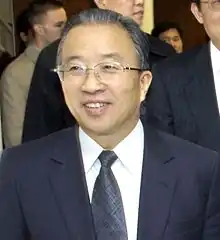Dai Bingguo
Dai Bingguo (simplified Chinese: 戴秉国; traditional Chinese: 戴秉國; pinyin: Dài Bǐngguó; born March 31, 1941) is a Chinese politician and professional diplomat. Since 2008, Dai has emerged as one of the foremost and highest-ranking figures of Chinese foreign policy in the Hu Jintao administration.
Dai Bingguo | |
|---|---|
戴秉国 | |
 | |
| Chairman of Jinan University | |
| In office 15 November 2013 – 15 November 2019 | |
| President | Hu Jun → Song Xianzhong |
| Preceded by | Qian Weichang |
| State Councilor of the People's Republic of China | |
| In office March 17, 2008 – March 16, 2013 | |
| Premier | Wen Jiabao |
| Secretary-general of the Foreign Affairs Leading Group | |
| In office April, 2005 – March, 2013 | |
| Leader | Hu Jintao |
| Preceded by | Liu Huaqiu |
| Succeeded by | Yang Jiechi |
| Personal details | |
| Born | March 31, 1941 Yinjiang County, Guizhou, Republic of China |
| Nationality | Chinese |
| Political party | Communist Party of China |
| Alma mater | Sichuan University China Foreign Affairs University |
A graduate of Sichuan University, majoring in Russian language, Dai was instrumental in the normalization of diplomatic relations between China and the Soviet Union. Between 1989 and 1991 Dai served as the Chinese ambassador to Hungary. He then served in a succession of roles in the Department of Foreign Affairs. He served as a State Councilor, director of general office of foreign affairs leadership group of CPC Central Committee, an office that acts as the primary foreign affairs organ of the Communist Party of China, and director of general office of National Security Leadership Group of the CPC Central Committee, in which he serves in the capacity as a national security advisor to the CPC General Secretary.
Biography
Dai Bingguo was born in a village located in Yinjiang County, Guizhou Province. He belongs to the Tujia ethnic minority. He graduated from the department of foreign languages of Sichuan University, majoring in Russian, and later studied at the China Foreign Affairs University (CFAU). He joined the Communist Party of China in June 1973. He served as the Chinese Ambassador to Hungary from 1989 to 1991. He had served in the Foreign Ministry of the PRC for many years and was elevated to Vice Foreign Minister in December 1993. In June 1995, Dai was transferred from the "foreign affairs system" of the State Council to the "international liaison system" of the Central Committee of the CPC, and became Vice Director of the International Department of the Central Committee of the CPC. In August 1997, on the eve of the 15th CPC National Congress, he was promoted to Director of the International Department. In May 2003, Dai returned to the Foreign Ministry and served as Vice Minister until April 2008, being responsible for handling the North Korea nuclear crisis. In March 2008, he was appointed State Councilor and Party group member on the State Council.
On July 8, 2009, Dai replaced the China's paramount leader Hu Jintao at the G8 summit in L'Aquila, Italy.[1] Hu suddenly had to leave the summit because of July 2009 Ürümqi riots between Uyghurs and Han-Chinese.
In 2009, Dai was appointed by Chinese leader Hu Jintao as his special representative to chair the Strategic Track of the U.S.-China Strategic and Economic Dialogue for the Chinese side.
Personal
Dai is the son-in-law of Huang Zhen, a senior Chinese diplomat, former vice Foreign Minister, Minister of Culture and first vice director of propaganda department of CPC Central Committee. He was a member of the 15th, 16th and 17th Central Committees of Communist Party of China.
External links
- Dai Bingguo's profile at people.com.cn (in Chinese)
References
- "Chinese President Hu Jintao cancels G8 attendance". MarketWatch. 2009-07-10. Retrieved 2009-07-10.
| Party political offices | ||
|---|---|---|
| Preceded by Liu Huaqiu |
Secretary-general of the Foreign Affairs Leading Small Group 2005–2013 |
Succeeded by Yang Jiechi |
| Secretary-general of the Central Leading Group for Taiwan Affairs 2005–2013 | ||
| Preceded by Li Shuzheng |
Head of the CPC Central Committee International Liaison Department of the 1997–2003 |
Succeeded by Wang Jiarui |
| Academic offices | ||
| Preceded by Qian Weichang (until 2010) |
Chairman of the Board of Jinan University November 2013 - |
Incumbent |
